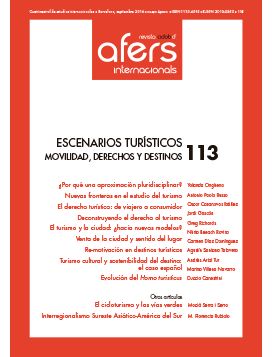El turismo y la ciudad: ¿hacia nuevos modelos?
Palabras clave:
turismo, Barcelona, cocreación, impactos del turismo, AirbnbResumen
Revista CIDOB d’Afers Internacionals, nº 113
Cuatrimestral (mayo-septiembre 2016)
ISSN:1133-6595 | E-ISSN:2013-035X
DOI: https://doi.org/10.24241/rcai.2016.113.2.71
El turismo está experimentando cambios significativos con la globalización y las nuevas tecnologías de la información. Las experiencias turísticas son, cada vez más, coproducidas por las empresas turísticas, los turistas y los residentes locales. Ello tiene consecuencias significativas para ciudades como Barcelona, donde se ha producido un auge de nuevos productos turísticos a través de nuevos intermediarios como Airbnb. Como consecuencia, el turismo está penetrando más en el tejido de la ciudad y está siendo producido también por los propios residentes de Barcelona. Tal vez por esta razón, estos se quejan menos de los efectos negativos del turismo de lo que cabría esperar.
Citas
Ajuntament de Barcelona (Departament d’Estudis d’Opinió). Percepció del turisme a Barcelona: presentació de resultats. Ajuntament de Barcelona, 2013.
Arias Sans, Albert y Quaglieri Domínguez, Alan. «Unravelling Airbnb. Urban perspectives from Barcelona», en: Russo, Paolo y Richards, Greg (eds.). Reinventing the local in Tourism. Bristol: Channel View, 2016.
Beck, Ulrich. Risk Society: Towards a New Modernity. Nueva Delhi: SAGE, 1992.
Bialski, Paula. «Authority and Authorship: Uncovering the socio-technical regimes of peer-to-peer tourism», en: Russo, Paolo y Richards, Greg (eds.) Reinventing the local in Tourism. Bristol: Channel View, 2016.
Deegan, Monica. «Consuming urban rhythms: Let’s Ravaljar», en: Edensor, Tim (ed.) Geographies of Rhythm: Nature, Place, Mobilities and Bodies. Farnham: Ashgate, 2010, p. 21-32.
Habermas, Jürgen. The theory of communicative action. Vol. 1 y 2. Boston: Beacon, 1987.
Hannigan, John. Fantasy City: Pleasure and profit in the postmodern metropolis. Londres: Routledge, 1998.
Hidden City Tours. «Meet the team». s.f. (en línea) http://www.hiddencitytours.com/meet-the-team.html
MacCannell, Dean. The Tourist: A New Theory of the Leisure Class. Nueva York: Schocken Books, 1976.
Meet Barcelona, «Living harmoniously». Ajuntament de Barcelona, 2015 (en línea) http://meet.barcelona.cat/en/visit-barcelona/living-together Paris, Cody Morris y Hannam, Kevin. «(Dis)engaging the local: Backpackers’ usage of social media during crises», en: Russo, Paolo y Richards, Greg (eds.) Reinventing the local in Tourism. Bristol: Channel View, 2016.
Richards, Greg. «Avaluació de les Actituds en relació al Turisme per part dels habitants de Barcelona». Ajuntament de Barcelona, Direcció de Serveis de Turisme i Qualitat de Vida, 2005, 2006.
Richards, Greg. «Creativity and tourism: The state of the art». Annals of Tourism Research, vol. 38, n.º 4 (2011), p. 1.225-1.253.
Rojek, Chris y Urry, John. Transformations of Travel and Theory. Londres: Routledge, 1997.
STAY WYSE. «Youth travel accommodation study». Ámsterdam: WYSE, 2013.
Tallantyre, Steve. «Barcelona eyes fines for drivers who bully cyclists». thelocal. es (25 de noviembre de 2014) (en línea) http://www.thelocal.es/20141125/barcelona-to-fine-drivers-who-harass-cyclists
The Netherlands by Numbers. «Seven things you need to know about Dutch bikes». 2013 (en línea) https://netherlandsbynumbers.com/2013/07/27/seven-things-you-need-to-know-about-dutch-bikes/#comments
TripAdvisor. «About TripAdvisor». 2015 (en línea) http://www.tripadvisor.com/PressCenter-c6-About_Us.html
Turisme de Barcelona. Tourism statistics in Barcelona and regions. Synthesis 2014. Barcelona: Turisme de Barcelona, 2015.
Urry, John. The Tourist Gaze. Londres: SAGE, 1990.
Wang, Ning. «Rethinking authenticity in tourism experience». Annals of Tourism Research, vol. 26, n.º 2 (1999), p. 349-370.
WYSE. New Horizons III. A global study of the youth and student traveller. Ámsterdam: WYSE, 2013.
WYSE. Millennial Traveller Survey. Amsterdam: WYSE, 2014.
WTTC. The Comparative Economic Impact of Travel & Tourism. Londres: WTTC, 2012.













